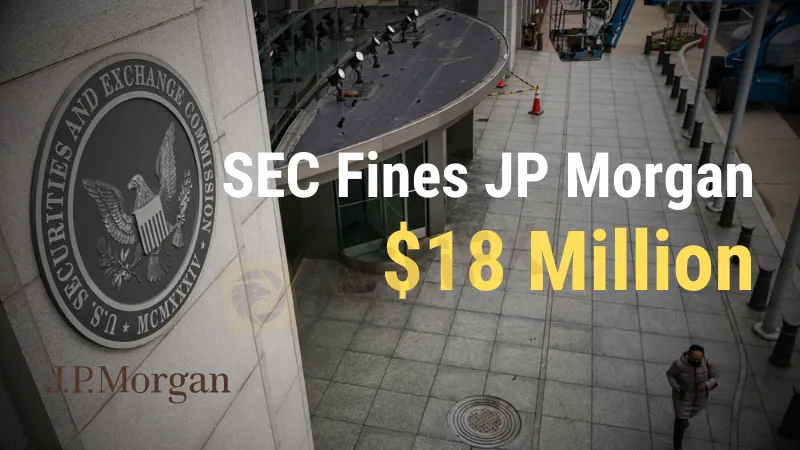简体中文
繁體中文
English
Pусский
日本語
ภาษาไทย
Tiếng Việt
Bahasa Indonesia
Español
हिन्दी
Filippiiniläinen
Français
Deutsch
Português
Türkçe
한국어
العربية
SEC Fines JP Morgan $18 Million
Abstract:JP Morgan hit with $18M fine for SEC whistleblower rule violation. Learn about the case and its implications. Stay informed with our updates.

J.P. Morgan Securities LLC (JPMS) has found itself in hot water with the Securities and Exchange Commission (SEC) and has agreed to pay a substantial $18 million penalty to resolve allegations of wrongdoing. The SEC has accused JPMS of obstructing its clients from reporting potential violations of securities laws to the regulatory body, a clear violation of whistleblower protection rules.
Here's the crux of the matter: From March 2020 to July 2023, JPMS repeatedly requested its retail clients to sign confidential release agreements, but only if they had received credits or settlements from the company exceeding $1,000. These confidential agreements mandated that clients keep any information related to the settlement and underlying facts confidential. More importantly, these agreements prohibited clients from voluntarily reaching out to the SEC, even though they were allowed to respond to SEC inquiries.
The SEC has come down hard on JPMS for this practice. According to Gurbir S. Grewal, Director of the SEC's Division of Enforcement, “Whether it's in your employment contracts, settlement agreements, or elsewhere, you simply cannot include provisions that prevent individuals from contacting the SEC with evidence of wrongdoing.” Essentially, JPMS put its clients in a difficult situation by making them choose between receiving settlements or credits from the firm and reporting possible securities law violations to the SEC. This either-or scenario not only compromised critical investor protections but was also found to be illegal.

Corey Schuster, Co-Chief of the Enforcement Division's Asset Management Unit, emphasized that “Investors, whether retail or otherwise, must be free to report complaints to the SEC without any interference.” Anyone drafting or using confidentiality agreements needs to ensure they do not include provisions that obstruct potential whistleblowers.
JPMS has been found in violation of Rule 21F-17(a) under the Securities Exchange Act of 1934, a whistleblower protection rule explicitly prohibiting actions that hinder individuals from communicating directly with the SEC staff regarding possible securities law violations. While JPMS did not admit wrongdoing, it agreed to a series of measures. These include accepting censure, committing to cease from violating the whistleblower protection rule in the future, and paying the $18 million civil penalty.
The SEC's investigation into JPMS's practices was conducted by Marie DeBonis and Jessica Neiterman, with the assistance of John Farinacci, and it was overseen by Virginia Rosado Desilets, Brianna Ripa, Mr. Schuster, and Andrew Dean, all members of the SEC's Asset Management Unit. Rua Kelly of the Trial Unit also provided support during the investigation.
In conclusion, JPMS's $18 million penalty underscores the importance of adhering to whistleblower protection rules and ensuring that individuals, regardless of their position, can freely report concerns to the SEC. This case serves as a stark reminder that the integrity of our financial system relies on transparency and accountability, and actions that obstruct these principles will not be tolerated.
Explore J.P. Morgan's profile on WikiFX for in-depth information: Visit their WikiFX page here: https://www.wikifx.com/en/dealer/8981623292.html

Disclaimer:
The views in this article only represent the author's personal views, and do not constitute investment advice on this platform. This platform does not guarantee the accuracy, completeness and timeliness of the information in the article, and will not be liable for any loss caused by the use of or reliance on the information in the article.
Read more

CME International Records a Massive Jump in Forex Volumes
CME International recorded a record surge in its foreign exchange trading volumes during the second quarter. Check out its performance across products and markets.

Scam Brokers Exposed! FCA Warns Traders to Stay Safe
If you are into forex trading, you need to protect your money from investment scams. Many scam brokers are active in the market now. The FCA, a reputed financial regulator, has issued a list of unlicensed brokers you need to stay away from.

Interactive Brokers Launches IBKR InvestMentor App for Beginners
Interactive Brokers introduces IBKR InvestMentor, a new mobile app delivering free, interactive investing lessons for beginners and aspiring investors.

New to Forex Trading in India? Here's How You Can Start and Maximize
Want to begin your forex trading journey in India? Here's a guide that will help you open and close trading positions effectively, resulting in enhanced returns and minimized risks.
WikiFX Broker
Latest News
Alchemy Markets Review 2025: Key Facts and Insights
Largest Market Makers
Temasek's portfolio scales new peak even as divestments hit over 2-decade high
Exposing Trade Capital Limited - Siphoning Millions, Restricting Withdrawals, Charging Extra Fees
GMI Edge: A Closer Look at Its Licenses
How Do I Place a Stop-loss Order?
5 Serious Warnings About Mirrox! You Can’t Afford to Ignore
FXPRIMUS: 5 Things They Don’t Want You to Know
Manual vs. Automated Forex Trading: Which One Should You Choose?
Mining firms lift FTSE 100 to record high after Trump confirms 50% copper tariff
Currency Calculator


